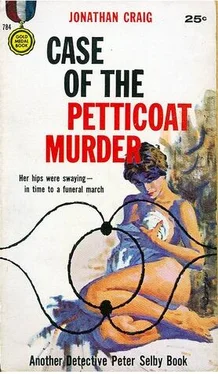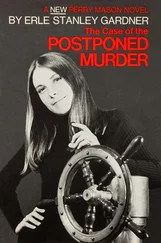“I hope there's no shooting,” the proprietor said. He was a very old man; old enough to mean what he said.
“Neither do we,” Stan said. “Better stay inside.”
The proprietor closed the door and Stan and I walked across the court and paused before the steps that led down to the basement.
“He must have come in through a space between the houses on the next street,” Stan said. “Damn, it's dark enough for a flashlight.”
“Not so loud,” I said, and went down the steps to the door. It was made of wood, and when I pulled it toward me, it gave an inch and then held.
“Hook and eye on the inside,” I whispered to Stan who had just stepped down beside me.
“You've got more muscles than I have,” he said. “After you.”
I worked my fingers between the door and the jam and pried back as slowly and steadily as I could. There was a soft, tearing sound; then the hook ripped free from the rotting wood and the door swung outward.
We paused, listening. But there was no sound from inside, and a moment later we stepped into a dank, moldering hallway littered with debris and almost completely dark.
But not quite. Midway down the hallway an orange sliver of light measured the width of a door on the crumbling concrete floor just outside it.
I felt Stan's hand on my shoulder. “You see it?” he whispered.
“Yes.”
“How do we do it?”
“You mean, are we polite?”
“Yeah.”
“No. The door gets the treatment. You hug the wall, just in case.” I went forward quietly, taking out my gun.
When I reached the door, I braced my shoulders against the wall opposite it, waited till Stan was in position beside it, and then drew back my foot and booted the wood as hard as I could.
My foot went all the way through it.
I drew it back again, booted the door a little closer to the jamb, and stepped inside as the door ripped open and whipped around to slam against the wall. Stan was just behind me.
The room was swelteringly hot and stank like a garbage heap in the noonday sun. There were two filthy mattresses side by side in one corner, newspapers spread on the concrete floor in lieu of a carpet, a brown-scummed toilet and sink with an overflowing refuse can between them, scraps of food and cigarette butts everywhere, and a good-sized cardboard carton near the door heaped to the top with empty liquor bottles and beer cans. The walls held a few items of clothing suspended from nails and a considerable number of pornographic drawings, the latter apparently photostated blowups of the kind of illustrations found in privately published “cartoon books.”
The light had come from a kerosene lantern sitting on an upended soap box near the mattresses.
There was a man lying on the mattresses, but it had taken only a casual glance to know he would be no problem. He lay with his mouth open, his chest moving slowly, his body half on one mattress and half on the other, and his face moist and yellow in the flickering light of the lantern.
Benny Bucket's wife had said that Johnny Farmer was the tallest man she'd ever seen off a basketball court, and now I realized she hadn't been exaggerating. From the top of his ash-blond head to the soles of the half-boots with their crisscrossed chains, Farmer was easily six foot seven
“He must have grown up instead of out,” Stan said as we stood looking down at him. “I'll bet he doesn't weigh much more than I do.”
“He isn't much better-looking, either,” I said. “Let's get some cuffs on him and wake him up.”
I bent down, handcuffed Farmer's wrists behind him, and shook him roughly by the shoulder. He groaned, muttered something unintelligible, and turned his head the other way.
“Alky stupor,” Stan said. “Probably be out for hours.”
My eyes were slowly adjusting themselves to the dim lantern light, and now I saw something I had missed before. It was a good-sized metal box wedged between the edge of one of the mattresses and the wall. I stepped over Farmer's body, lifted the box, and took it closer to the lantern.
The box was, I felt certain, the same gray-enameled fish-tackle box that Marty Hutchins had described for me as the one which the dead girl had kept in the bottom drawer of her dresser. There were sturdy hasps for a padlock, but the lock itself was missing.
Farmer moaned again and moved one leg a little.
“Better search him while he's still so peaceable, Stan,” I said. “But leave all his personal stuff in his pockets. No use giving him grounds for any squawks later on.”
While Stan went through Farmer's pockets I looked in the metal box.
There was nothing in the box but a long, narrow, very expensive-looking alligator handbag and, sticking to the bottom of the box, a buff-colored piece of paper just a little larger than a post card.
I looked first at the piece of paper. It was a billhead, imprinted at the top with the name and address of the Joyner Translation Bureau and addressed to Miss Nadine Ellison at her address on Bleecker Street. It was dated some five months ago, marked paid, and bore the typed notation:
1 translation approx. 400 wds. printed matter. (Minimum fee) $15
1 certified copy of above 1
Total $16
At the bottom of the billhead was a statement to the effect that the Joyner Translation Bureau specialized in the translation of foreign medical and legal journals, and that copies of all work were retained permanently.
There was Nothing whatever to indicate the nature of the printed matter Nadine had had translated.
I folded the billhead, tucked it in my breast pocket, and examined the alligator handbag.
I was no expert on ladies' purses, but I did know that this particular one had cost a great deal of money. It wasn't so much the fact that all metal parts were of silver as it was that the entire bag, from first operation to last, had been done by hand.
The bag appeared to have seen very little use and was completely empty.
Stan walked over to me, weighing something in his hand.
“I'll trade you,” he said, and held out a pair of sapphire earrings. Even in the poor light from the lantern the stones burned like blue-black fire.
“Those are for pierced ears, Stan,” I said. “I couldn't wear them.”
He dropped the earrings into one of the small cellophane envelopes detectives carry for such purposes and put the envelope in his pocket. “What was in the box?”
I showed him the handbag and the receipted bill.
“This isn't the kind of bag a woman would hide away.”
“Why even keep a box in the first place?” he asked.
“People get some pretty weird ideas about security,” I said. “But the point is, she kept the bag and the receipted bill in what she thought was a safe place.”
“Didn't Marty Hutchins tell you she kept all kinds of stuff in there?”
“Yes, but I don't think he meant to stretch that far enough to include something like a handbag. It just doesn't jibe out somehow.”
“You worry about the bag,” he said. “Me, I'm interested in that bill, Nadine wasn't any lawyer or doctor, was she? What'd she want with a translation like that?”
“The outfit will have a copy of whatever it was.”
“Sure, but that doesn't mean we'll know what she wanted with it.” He shook his head.
“Anyhow,” I said, “it's no problem. What we've got to do now is—”
There was a sort of muffled yell. Johnny Farmer sat up suddenly, lost his balance, realized his hands were cuffed behind him, and rolled over on his side. In another instant he was sitting up again and trying very hard to get to his feet.
“Stay where you are, Johnny,” Stan said.
Farmer's pale eyes were slightly protuberant to begin with, and now they bulged even more. “Goddam,” he said thickly. “I'll be goddam.”
Читать дальше












